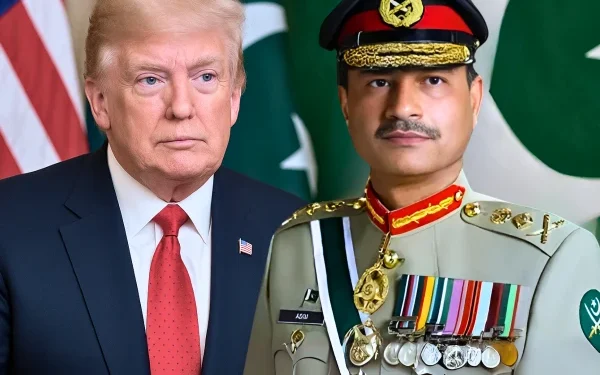Introduction
In a significant diplomatic development, the globally respected British publication Financial Times has reported on a surprising and rapid improvement in relations between Pakistan and the United States under former U.S. President Donald Trump’s administration. This evolving partnership, marked by high-profile visits, security cooperation, and new economic deals, has reportedly alarmed India, which views the shift as a strategic challenge to its regional influence.
The report underscores that this warming of ties is not only unexpected given past tensions between Washington and Islamabad, but also strategically significant in reshaping South Asian geopolitics. The evolving relationship is rooted in diplomatic outreach, counterterrorism cooperation, and emerging trade and investment ventures, with both sides showing a willingness to overlook past grievances in favor of mutually beneficial engagements.
Historic Context: From Hostility to Engagement
For much of Donald Trump’s presidency, Pakistan faced stern criticism from the White House. Trump had previously accused Islamabad of harboring terrorists and providing safe havens to militant groups operating in Afghanistan. In 2018, the U.S. suspended military aid to Pakistan, citing insufficient action against terrorism.
Against this backdrop, the recent warming of ties marks a stark reversal. The Financial Times describes this shift as “astonishing” and suggests that Pakistan has skillfully adapted its diplomatic strategy to appeal to the unconventional leadership style of Donald Trump.
High-Level Diplomatic Engagements
General Asim Munir’s Visits to the U.S.
The Financial Times report highlights two high-level visits made by Field Marshal General Asim Munir to the United States during the summer.
- Visit to Florida – The most recent trip was to Florida, where General Munir attended the retirement ceremony of General Michael Corella, the head of the U.S. Central Command (CENTCOM). The presence of Pakistan’s military chief at such a prestigious event underscores the importance of military-to-military ties in shaping the renewed relationship.
- Private Lunch with President Trump – In June, General Munir held a private two-hour lunch meeting with Donald Trump. This meeting occurred just one month after the bloodiest clash between Pakistan and India in decades, making it particularly significant in the context of regional tensions.
Changing Perceptions in Washington
The fact that Donald Trump, once openly critical of Pakistan, is now engaging directly with its leadership is a major shift. Senior analyst Michael Kugelman of the Asia Pacific Foundation described it to the Financial Times as “an unexpected relaunch” and “a new era” in bilateral ties. He emphasized that Pakistan has demonstrated a keen understanding of how to engage with Trump, combining strategic overtures with relationship-building efforts.
Key Factors Driving the Rapprochement
The Financial Times outlines several strategic moves by Pakistan that have helped cement this new partnership:
1. Counterterrorism Cooperation
In March, Pakistan arrested and handed over to U.S. authorities a high-value ISIS-Khorasan suspect believed to be the mastermind of the 2021 Kabul airport bombing, which killed over 170 people, including 13 American service members. Trump publicly praised this operation in his “State of the Union” address, calling it a major achievement for Pakistan.
2. Business and Economic Engagement
Pakistan has tapped into Trump’s business network by fostering links in areas such as:
- Energy – Exploring potential U.S.-Pakistan energy cooperation.
- Mineral Resources – Highlighting Pakistan’s vast reserves of copper, gold, and rare earth minerals.
- Cryptocurrency – Facilitating an agreement in April between World Liberty Financial (a Trump-backed crypto venture) and Pakistan’s Crypto Council. One of the venture’s founders lauded Pakistan’s mineral wealth during a visit.
3. Positive Messaging to the White House
Pakistan has deliberately shifted its diplomatic tone, focusing on areas of common interest, mutual respect, and security cooperation, rather than contentious issues.
India’s Strategic Concerns
India has reacted sharply to the warming Pakistan-U.S. ties, particularly in the wake of several recent developments:
- Trade Disparities – The U.S. has reportedly raised import tariffs on Indian goods to 50%, while keeping Pakistan’s tariffs at 19%, a move viewed in New Delhi as preferential treatment for Islamabad.
- Diplomatic Disputes – Indian Prime Minister Narendra Modi publicly denied Trump’s claim that the U.S. brokered a ceasefire between India and Pakistan in May, insisting that the agreement was reached directly between the two militaries without U.S. mediation.
- Security Implications – The Indian strategic community fears that renewed U.S.-Pakistan security cooperation could translate into greater military and intelligence collaboration, potentially altering the regional balance of power.
Regional Impact: A Geopolitical Realignment
The growing U.S.-Pakistan partnership could have ripple effects across South Asia and beyond:
- Afghanistan and Counterterrorism – U.S. reliance on Pakistan’s intelligence and counterterrorism capabilities could increase, especially in monitoring militant threats in the region after the U.S. withdrawal from Afghanistan.
- China-Pakistan-U.S. Triangle – Pakistan’s close ties with China remain intact, but the new U.S. outreach could position Islamabad as a balancing player between Beijing and Washington.
- India-U.S. Relations – While Washington still maintains a strategic partnership with India, particularly through the Quad alliance (U.S., India, Japan, Australia), the perception of favoritism toward Pakistan could complicate bilateral relations.
Trump’s Foreign Policy Approach
Donald Trump’s diplomatic style has often defied conventional U.S. foreign policy norms. His personal rapport with foreign leaders, willingness to engage in unconventional deals, and emphasis on transactional diplomacy make it possible for countries like Pakistan to reposition themselves favorably. Analysts believe that Islamabad’s outreach fits well into Trump’s preference for results-oriented partnerships.
Potential Future Developments
If the current trajectory continues, the U.S.-Pakistan relationship could expand into several areas:
- Defense Cooperation – Possible resumption of military aid and joint training programs.
- Economic Investments – Increased U.S. private sector investments in Pakistan’s energy, technology, and mining industries.
- Digital Economy – Further collaboration in blockchain technology and cryptocurrency regulation.
- Diplomatic Mediation – Potential U.S. involvement in easing India-Pakistan tensions, despite New Delhi’s reservations.
Conclusion
The Financial Times report captures a moment of significant geopolitical transition. The once frosty relations between Islamabad and Washington under Donald Trump have undergone a rapid and unexpected thaw, resulting in growing cooperation in security, economic, and diplomatic spheres. While Pakistan views this as a strategic victory and an opportunity to strengthen its global standing, India sees it as a worrying shift that could undermine its regional influence.
The coming months will reveal whether this warming of ties represents a short-term tactical alignment or the foundation of a more enduring partnership. Either way, the new chapter in U.S.-Pakistan relations is reshaping the strategic landscape of South Asia, with implications that extend far beyond the region.

























